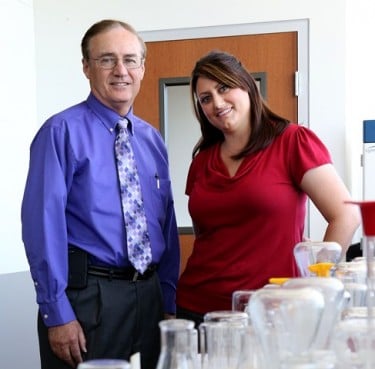By Michael Ferraresi
GCU News Bureau
By this fall, students interested in careers in computer science and information technology can begin working toward their undergraduate degrees at Grand Canyon University.
Those Bachelor of Science degrees, announced earlier this week, are just the beginning of GCU’s push toward expanding academic programs in science, technology, engineering and math — otherwise known as the STEM competencies.
The University hopes to have dozens of students enrolled for the upcoming academic year, allowing them to serve as pioneers in the programs that could lead them to jobs as computer systems analysts, database managers, information technology security specialists and software engineers.
Dr. Michael Mobley, executive director for GCU’s Center for Integrated Science, Engineering and Technology, explained that the University launched computer science and information technology degrees first because of the significant need for skilled professionals in those fast-growing tech sectors both nationally and in Arizona.
“It starts with that, and then we looked further in terms of what the actual employers are looking for in the competencies of the students or the future employees they’re hiring,” said Mobley, who believes GCU’s focus with the new programs would be on applying training in a collaborative, Christian classroom environment that prepares them for the leap into the professional workforce.
There are six individual emphases under the new B.S. degrees, which are offered by the College of Arts and Sciences. Computer science majors have the opportunity to specialize in game and simulation development, big data and analytics, and business entrepreneurship. The B.S. program in information technology also features a business entrepreneurship emphasis, in addition to those in health care information technology and technology innovation. (View full course descriptions by clicking HERE.)
Mobley joined GCU last year after serving as associate director at Arizona State University’s Biodesign Institute. He was tapped to help develop an “engineering mindset” at GCU, in addition to engineering curriculum for undergraduate programs by 2015.
GCU launched CISET last year with a mission statement that noted the need to “innovate through training initiatives and internships designed in conjunction with educational and industry partners.” Later this spring, GCU will formally announce members of a STEM advisory board comprised of tech industry executives and educational leaders. That board will provide strategic direction to President and CEO Brian Mueller and other University leaders about STEM program expansion and development, so that GCU can remain focused on addressing tech-related needs in the community.
“We believe it’s critical to have a positive interface with potential employers,” Mobley said. “We have to be active with building these partnerships and relationships with industry to create opportunities, not only for continuous feedback on our program, but for our students to go into potential internships and employment.”
GCU is currently interviewing potential faculty for new full-time campus positions for the new B.S. programs. Mobley said some computer lab classrooms would include hexagon-shaped tables where students can work off laptops and showcase projects with their classmates over 80-inch monitors. The idea is to emphasize intimate collaboration and understanding of the project-development mindset of many tech companies.
In addition to undergraduate general education courses, students who elect the new B.S. degrees will be required to complete ”STEM core” classes in intensive science and math courses already offered through Arts and Sciences. Mobley said the University wanted to ensure a firm foundation in science and math before students enter their major core and emphases coursework.
Mobley added that refined focuses around data analytics and health care technology, for example, provide students with a direct gateway into niche tech areas. The ground campus, he said, provides opportunity for interdisciplinary studies — linking tech students to business and nursing programs that could augment their studies in their focus areas.
Haley Peebles, associate director for CISET, said she and Mobley are working closely with the University’s office for strategic educational alliances to help secondary school faculty prepare their students for the rigors of college-level STEM programs.
Peebles, who previously taught GCU’s dissection classes in the campus cadaver lab, said she has noticed that students as young as sixth grade are already demonstrating a serious level of understanding of computer coding. For young people of that generation, gaming and simulation is a reality — and areas of study such as game and simulation development provide them with the forum to build virtual worlds that reflect the needs in corporate training, health care and education, among other industries.
“That’s when the innovation and ability to think comes in, because they’ve had their minds opened to the ‘what if’ scenarios,” Peebles said. “If they can think about it, they can create it, because they’ve been allowed to explore in this gaming environment.”
Contact Michael Ferraresi at [email protected] or 639.7030.










































































